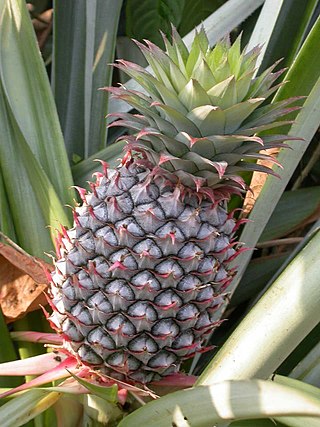
The Bromeliaceae are a family of monocot flowering plants of about 80 genera and 3700 known species, native mainly to the tropical Americas, with several species found in the American subtropics and one in tropical west Africa, Pitcairnia feliciana.

Spanish moss is an epiphytic flowering plant that often grows upon large trees in tropical and subtropical climates. It is native to much of Mexico, Bermuda, the Bahamas, Central America, South America, the Southern United States, and West Indies. It has been naturalized in Queensland (Australia). It is known as "grandpa's beard" in French Polynesia.

Tillandsia is a genus of around 650 species of evergreen, perennial flowering plants in the family Bromeliaceae, native to the forests, mountains and deserts of the Neotropics, from northern Mexico and the southeastern United States to Mesoamerica and the Caribbean to central Argentina. Their leaves, more or less silvery in color, are covered with specialized cells (trichomes) capable of rapidly absorbing water that gathers on them.

Tillandsia recurvata, commonly known as small ballmoss or ball moss, is a flowering plant in the family Bromeliaceae that grows upon larger host plants. It grows well in areas with low light, little airflow, and high humidity, which is commonly provided by southern shade trees, often the southern live oak. It is not a parasite like mistletoe, but an epiphyte like its relative Spanish moss.
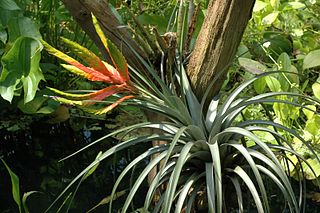
Tillandsioideae is a subfamily of plants in the bromeliad family Bromeliaceae. This subfamily contains the greatest number of species. Most are epiphytic or lithophytic, growing in trees or on rocks where they absorb water and nutrients from the air. Spanish moss of the genus Tillandsia is a well-known species. Bromeliads in the genera Guzmania and Vriesea are the more commonly cultivated members of this subfamily.
Christian Ludwig (Luis) Landbeck was a German ornithologist.
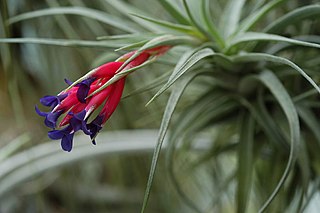
Tillandsia aeranthos is a species of plant in the genus Tillandsia. This species is native to southern Brazil, Paraguay, Uruguay, and Argentina.

Tillandsia paleacea is a species in the genus Tillandsia. This species is found from Colombia to Chile in arid biomes.
Tillandsia circinnatioides is a species of flowering plant in the genus Tillandsia. This species is endemic to Mexico.

Tillandsia geissei is a plant species in the genus Tillandsia. This species is endemic to Chile.
Tillandsia tragophoba is a species of flowering plant in the genus Tillandsia. This species is endemic to Chile.

Tillandsia crocata is a species in the genus Tillandsia. This species is native to Brazil, Bolivia, Argentina, Paraguay and Uruguay.
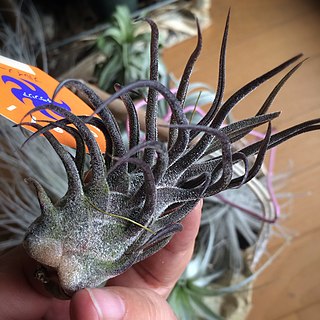
Tillandsia pruinosa, is a species of flowering plant in the family Bromeliaceae. It is commonly known as the fuzzywuzzy airplant. This species is native to northern South America, Central America, southern Mexico, the West Indies and Florida.

Tillandsia tenuifolia, the narrowleaf airplant, is a species in the genus Tillandsia. This species is widespread across much of South America and the Caribbean islands.

Tillandsia fasciculata, commonly known as the giant airplant, giant wild pine, or cardinal airplant, is a species of bromeliad that is native to Central America, Mexico, the West Indies, northern South America, and the southeastern United States. Within the United States, this airplant is at risk of extirpation from the Mexican bromeliad weevil, Metamasius callizona. A related plant, Tillandsia utriculata, sometimes called the "wild pine", is endemic to the same areas.

Tillandsia ionantha, the air plant, is a species of plant in the genus Tillandsia. This species is native to Central America and Mexico. It is also reportedly naturalized in Broward County, Florida.
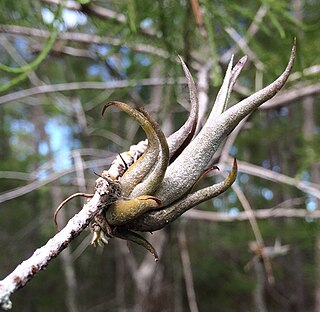
Tillandsia paucifolia, the potbelly airplant, is a species of bromeliad in the genus Tillandsia. This species is native to Central America, central and southern Mexico, Venezuela, Colombia, the West Indies, and Florida.

Tillandsia capillaris is a species in the genus Tillandsia. This species is native to southern and western South America.

Tillandsia virescens is a plant species in the genus Tillandsia. This species is native to Argentina, Bolivia, Chile and Peru. It was first described in 1802.
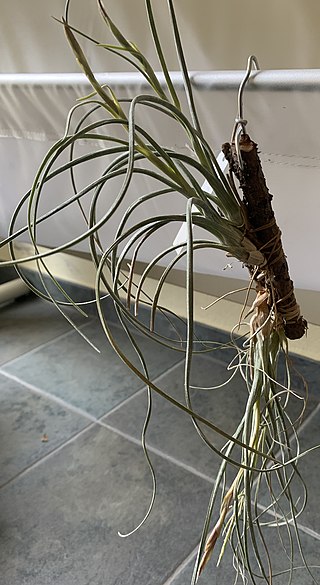
Tillandsia baileyi, commonly known as the reflexed airplant or Bailey's ball moss, is a species of bromeliad that is native to southern Texas in the United States and Tamaulipas in Mexico. It is found along the Gulf of Mexico from Kingsville, Texas to Tampico, Tamaulipas. Preferred host plants for this epiphyte include Southern live oak and Texas ebony.

















